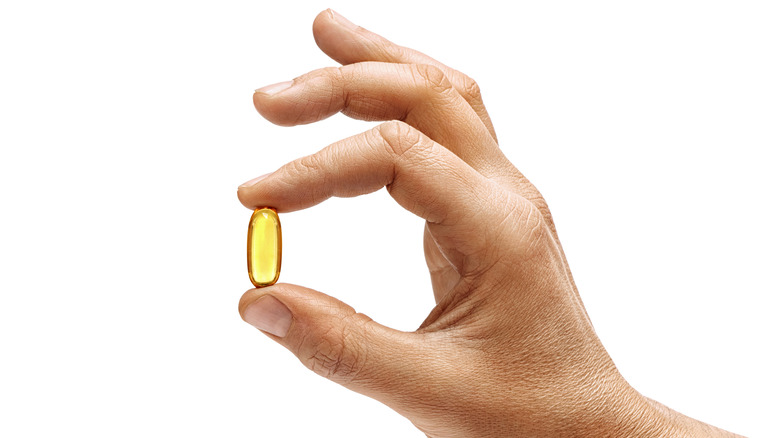How To Prevent Your Fish Oil From Tasting "Fishy"
Rich in omega-3s, fish oil supplements contain oil derived from the tissue of oily fish such as tuna, mackerel, or anchovies (via Healthline). Taking fish oil supplements can be a great way to ensure we're reaching the recommended dietary intake for omega-3 fatty acids. While the research is not conclusive, fish oil is thought to provide a host of health benefits, such as reducing one's risk for heart disease and inflammation, boosting vision and skin health, and helping relieve symptoms of depression and cognitive decline.
If you're not a fan of fish, fish oil supplements are a quick substitute — you can reap the health benefits without having to stomach that funky fish flavor. However, even when swapping in a capsule in place of a plateful of tuna, some people still complain of the fish burps (via mindbodygreen). If you find that fishy taste is lingering in your mouth long after you've taken your supplement, here's what it means, and here are some easy hacks for keeping the fish burps at bay.
Choose high-quality fish oil supplements
If your fish oil supplement comes with a fishy taste or smell, it may be an indication of the quality of the product. "If your fish oil smells funny —fishy, sour, or it's very yellow — these are signs of bad purity," nutritionist Dr. Ashley Jordan Ferira tells mindbodygreen. That fishy smell indicates the supplement is no longer as fresh as it once was. Experts explain this can result from oxidation during long-term storage — such as time spent baking in hot boxes during the shipping process — or from the use of lower-quality oil by the manufacturer.
Instead, opt for a high-quality product. Dr. Ferira says to determine the quality of a fish oil supplement, take note of its color. Capsules that are deep yellow in color should be avoided. Rather, capsules that are off-yellow or transparent in color are signs of a high-quality product that won't come with that fishy taste.
This is when you should take fish oil to avoid fish burps
Taking your fish oil supplement following a meal rich in dietary fat can help reduce the likelihood of fish burps (via SF Gate). That, or take smaller doses along with each of your daily meals, rather than one large dose at one time. You should avoid taking your fish oil alongside spicy food, as doing so can prompt indigestion, which increases the likelihood of fishy-tasting burps.
If you're trying to incorporate fish oil into your child's diet, supplements may pose a choking hazard for particularly young children and might not be a safe option. Therefore, some parents may opt for liquid fish oil, but fish oil in this form can be especially fishy. If your child is resistant to the taste, LiveStrong suggests blending the fish oil into your child's favorite snack. Such examples include fruit juice, applesauce, mashed potatoes, and peanut butter — all of which blend seamlessly with fish oil to mask the taste. Lastly, for children and adults alike, consider keeping your bottle of liquid fish oil cold by storing it in the fridge. Liquid fish oil kept at a lower temperature won't taste nearly as pungent.



